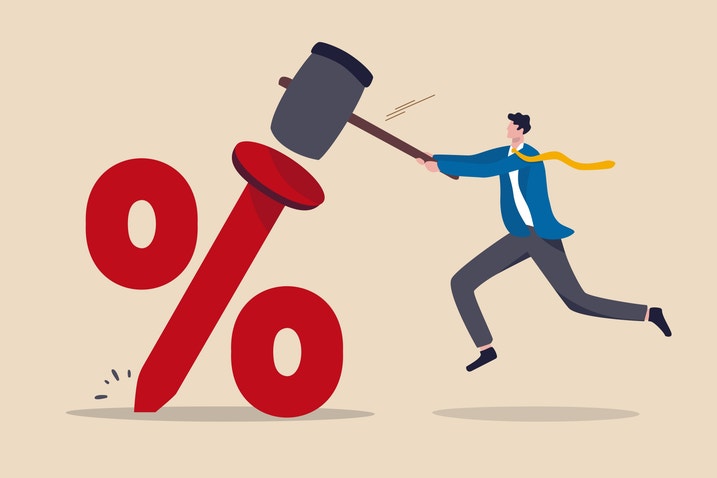Photo: Nuthawut Somsuk | iStock via Getty Images Plus
With the costs of automotive financing at historic highs, many shoppers may be wondering when car interest rates will go down, and unfortunately, the answer may not be what you want to hear. Recent Edmunds data indicates that new-car shoppers are financing their vehicles at around 7% APR, among the highest rates in nearly 20 years. With this in mind, here is some background on how car interest rates work, what factors will cause them to go down, and how to best manage this situation.
How do automotive interest rates work?
Automotive loan APRs are tied to several factors, the most significant of which is the Federal Reserve. As the country's central banking system, the Federal Reserve sets the federal funds rate; according to the Associated Press, this is the interest rate that determines what banks charge one another for borrowing money overnight. One positive side effect of high rates can be increased interest payouts on savings accounts, but anyone who takes out a loan when the rates are high will have more expensive monthly payments and pay out a higher amount of total interest.
When will interest rates go down?
The good news is that in 2024, the Federal Reserve cut interest rates from a high of 5.25%-5.5% in July 2023 to 4.25%-4.5% in December. This translated to car interest rates dropping from a high of 7.6% in October 2023 to 6.6% in December of last year. However, according to Edmunds data, those loan rates are creeping up again, rising to 7.0% in July 2025.
Although the Federal Reserve signaled earlier this year that it may cut rates, that plan seems to have stalled. While we previously advised that someone shopping for a car might want to wait, it seems as though interest rates will remain relatively stable, if high, for the foreseeable future.
That's why it's more crucial than ever to shop around for the best financing possible. Some new car dealerships might be able to lure shoppers in with special interest rates thanks to manufacturer incentives, but they might only apply to customers with exceptionally good credit or who make significant down payments. For everyone else, it's a good idea to check banks and credit unions for better financing.
To illustrate the importance of finding the best interest rate, let's take a popular car like the Toyota Camry, which has an MSRP of $34,895 in the well-equipped XLE trim. Financed for 60 months at an APR of 7.2% with a $3,500 down payment, that Camry will cost $625 per month, making the grand total $41,000 once the car has been fully paid off. Using the exact same terms but increasing the APR to 9.2% yields roughly a $655 monthly payment (without tax and title factored in) and a total loan cost of $42,800 — nearly $2,000 more for the exact same car. If you'd like to learn more, Edmunds' car affordability calculator can help you figure out the sweet spot for your budget.
Is now a good time to finance a car?
With interest rates near historic highs, borrowing money is more expensive than ever. Added to today's average transaction prices, the monthly payment on your new car could be higher than you're used to from your previous loan, especially if your credit is less than stellar. One way that a salesperson will suggest to lower monthly payments is to extend the length of your loan. But keep in mind that while it seems like you might be saving money, you'll end up paying more in total since the longer a loan, the more interest you'll pay.
Another way to save money — both every month and overall — is to opt for a less expensive new car. Despite high average transaction prices industrywide, there are still some impressive and affordable vehicles that come with that new-car smell, like the Chevrolet Trax and Nissan Versa. You should also consider a used car. While our experts are predicting that inventory may be limited, used cars will still be a way to save money on purchasing a car. Just bear in mind that used car loans often come with higher interest rates than if you buy new, so if you're not paying cash, it might be a good idea to pay down your loan principal as quickly as possible.
Related articles:
Best time to buy a new car
Best time to buy a used car
Can you compare interest rates before you buy a car?
As we mentioned above, some banks offer car loan preapproval so you can do some comparison shopping for better rates, just like you can for new car deals. But understand that any quotes you get from banks or credit unions might cause a hard inquiry on your credit report, which can sometimes lower your credit score temporarily. Some dealers and banks allow what are called soft inquiries, which don't show up on your credit report, therefore making them a safer bet for shopping around for the best rate.
And don't forget that some new car dealers will try to retain you as a customer through their own finance department by offering credit rebates, which cut the interest rate of the loan if you go through the automaker's financial services. If your dealer knows you're looking around for a cheaper loan, it may be willing to provide you with cash or APR incentives to ensure you finance with them instead.
Related articles:
How to Get a Car Loan
Buying a Car When Interest Rates Are High
